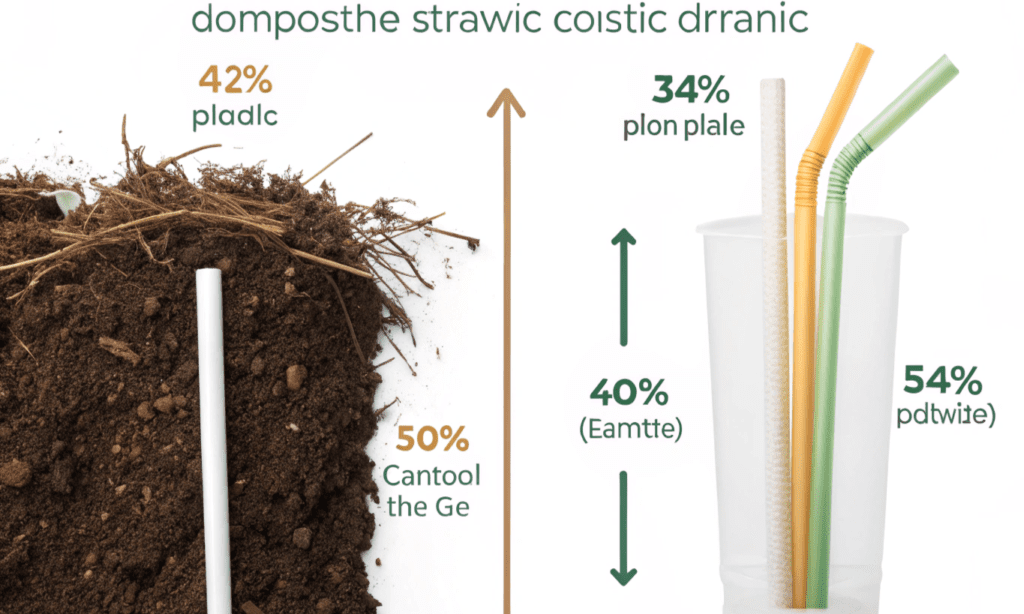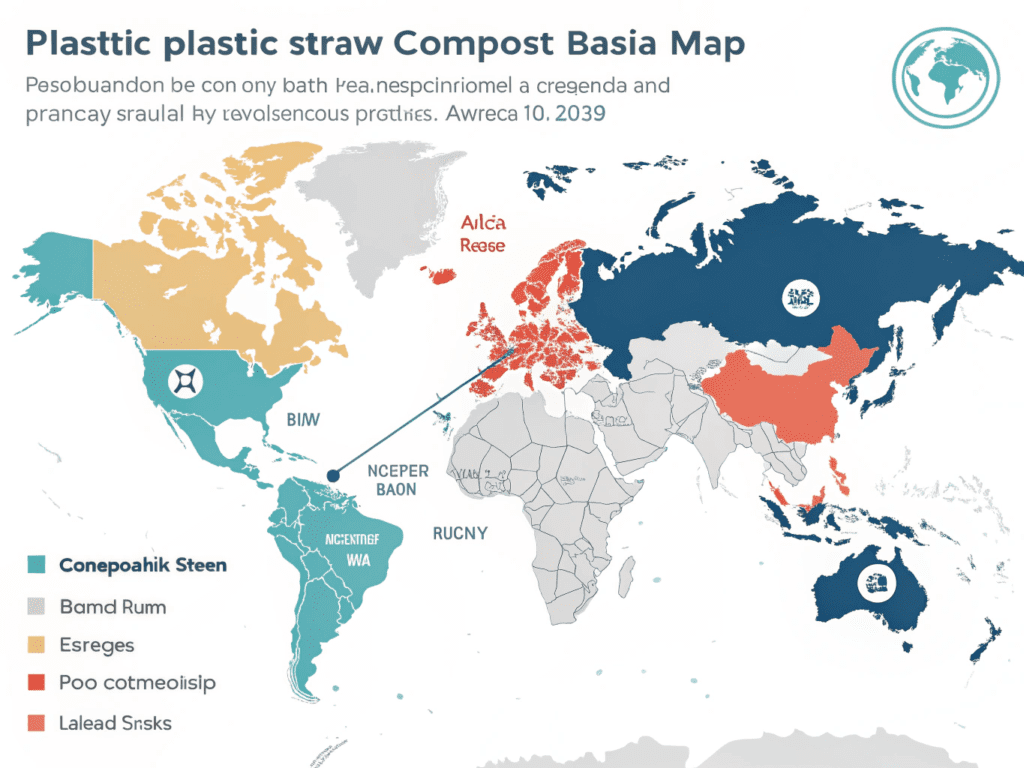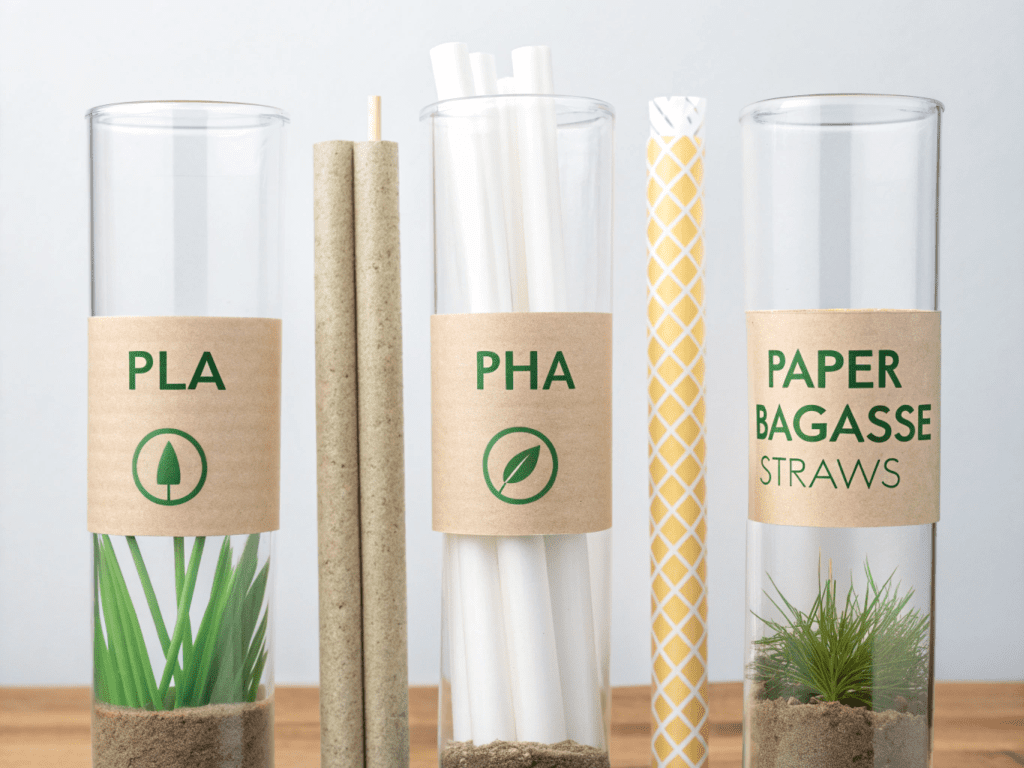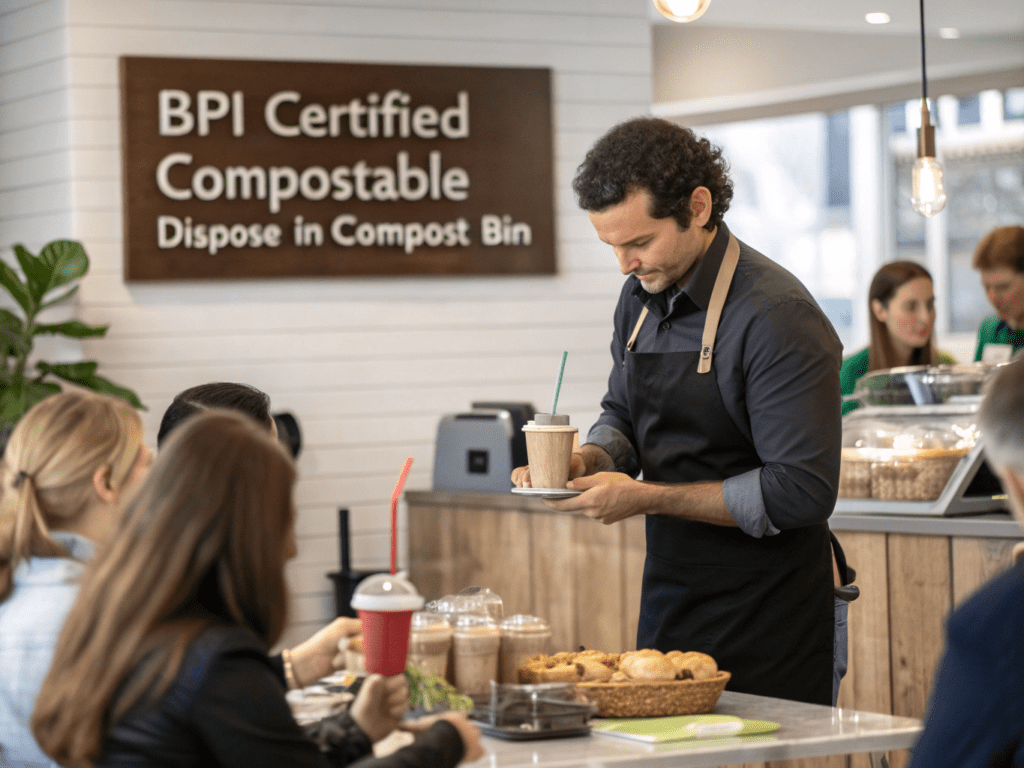
The escalating global plastic waste crisis presents an undeniable challenge and a significant opportunity for B2B decision-makers. With projections indicating plastic production could double by 2040 (Source: OECD, 2018; UNEP, 2021; Pew Charitable Trusts, 2020), the environmental and commercial impact of inaction is profound, risking operational disruptions, escalating regulatory penalties, and severe brand damage. Businesses, particularly those in hospitality, food service, and retail, are at a crossroads, pressured by consumers, investors, and governments to adopt genuinely sustainable practices.
Amidst this urgency,Compostable & BPI Certified Compostable Strawsemerge not merely as an eco-friendly choice but as a strategic imperative. These innovative alternatives offer a viable pathway to reducing plastic pollution, meeting evolving consumer demands, and proactively addressing stringent regulatory pressures. By integrating certified compostable straws into their operations, businesses can significantly advance their sustainability goals, enhancing brand reputation, and securing a competitive edge in a rapidly transforming market.Embracing certified compostable straws is a strategic imperative for B2B sustainability and competitive advantage.
Understanding Compostable & BPI Certified Compostable Straws: The Foundation for Responsible Sourcing

Navigating the landscape of sustainable disposables requires a clear understanding of material science and certification standards. For B2B procurement, distinguishing between various “eco-friendly” claims is paramount to avoid greenwashing and ensure genuine environmental impact.
Defining Compostable Materials and Their Environmental Impact
Compostable straws are fundamentally different from conventional plastics. They are typically crafted from plant-based polymers derived from annually renewable resources like corn resin (PLA), polyhydroxyalkanoate (PHA) from plant oils, or sugarcane bagasse. Unlike traditional plastics that persist in the environment for centuries, these materials are engineered to break down through microbial action.
In a proper composting environment, they decompose into natural elements: carbon dioxide, water, and biomass, crucially leaving behind no harmful residues or microplastics. This process contributes directly to a circular economy, transforming waste into valuable soil amendments, and significantly reducing landfill burden and ocean pollution. Understanding the decomposition times and conditions required for these materials is vital for effective waste management strategies. For a deeper dive into how long various compostable straws take to break down, explore our guide onበቀላሉ ሊቆጥረው የሚችል ገለባ ጊዜዎች.
BPI Certification: The Gold Standard for Compostable & BPI Certified Compostable Straws
For North American businesses, theየባዮዲተርስ ምርቶች ተቋም (BPII)stands as the leading authority for certifying compostable products and packaging. BPI certification provides an independent, third-party verification that a product meets rigorous scientific standards for industrial compostability. This includes adherence to ASTM D6400 or D6868 standards, which dictate specific requirements for materials to break down effectively in commercial composting facilities.
Products bearing the BPI certification mark are guaranteed to achieve at least 90% biodegradation within six months and demonstrate less than 10% residue after 12 weeks of industrial composting. Furthermore, BPI certification ensures that products leave no harmful residues, heavy metals, or toxic chemicals in the finished compost, providing a critical assurance of environmental safety and integrity. Businesses relying on BPI-certified products can confidently demonstrate their commitment to verifiable sustainability. For comprehensive details on BPI’s standards and certification process, visit the officialBPI website.
The Critical Distinction: “Compostable” vs. “Biodegradable” Products
In the realm of sustainable products, the terms “compostable” and “biodegradable” are often conflated, leading to confusion and potential greenwashing. For B2B decision-makers, understanding this critical distinction is crucial for responsible procurement and avoiding legal and reputational pitfalls.
“Compostable” is a highly specific term, meaning a product is capable of breaking down into natural, non-toxic components in a designated composting environment (either industrial or home composting). It implies a controlled process that yields valuable soil amendment. In contrast, “biodegradable” is a vague and often misleading term. While technically true that everything eventually “biodegrades,” this label provides no specific timeframe, conditions, or guarantees regarding the absence of harmful residues. Many products labeled “biodegradable” require conditions not found in nature or can still leave microplastic fragments.
Legislation reflects this distinction. For instance, California’s AB 1201 (2021) prohibits the use of misleading terms like “biodegradable,” “degradable,” or “decomposable” on plastic products unless they are certified compostable by a third party. This anti-greenwashing legislation ensures that B2B investments genuinely support sustainability claims, protecting businesses from deceptive marketing and ensuring effective waste diversion. To gain a deeper understanding of these crucial differences and their implications for sustainable sourcing, consult our detailed guide:ቢፒአይ በቀላሉ ሊቀላቀል የሚችል VS Bocivergred: ዘላቂነት መመሪያ.Understanding compostable vs. biodegradable is crucial for responsible B2B sustainable sourcing.
The Regulatory Landscape: Driving Adoption of Compostable & BPI Certified Compostable Straws

The global movement to reduce single-use plastics has rapidly evolved from consumer preference to legislative mandate, profoundly impacting B2B operations. Procurement managers and supply chain executives must proactively navigate this dynamic regulatory environment to ensure compliance and avoid costly penalties.
Navigating Plastic Straw Bans and “Straws Upon Request” Policies
Across the United States and Europe, a patchwork of regulations is reshaping the market for disposable straws. Cities and states have taken decisive action to curb plastic pollution:
- San Francisco, California: As of January 1, 2020, San Francisco banned single-use plastic straws, requiring alternatives made of natural fiber or paper to be BPI or TÜV AUSTRIA certified, specifically prohibiting PLA straws if littered, treating them like conventional plastic.
- Seattle, Washington: Effective July 1, 2018, Seattle implemented a comprehensive ban on single-use plastic straws and utensils, mandating compostable or reusable alternatives.
- New York City, New York: As of November 1, 2021, food service businesses are no longer permitted to provide single-use plastic beverage straws except upon request. This “straws upon request” policy, common in many jurisdictions, necessitates businesses to keep a supply for individuals with disabilities while discouraging routine plastic use.
These policies, along with similar measures across the EU’s Single-Use Plastics Directive, underscore a clear legislative trend: a concerted move away from conventional plastic disposables. Businesses that proactively adopt certified compostable solutions gain a significant advantage in market access and operational flexibility.
For more details on California’s efforts to combat plastic pollution and ensure accurate labeling for compostable products, refer to theCalifornia Department of Resources Recycling and Recovery (CalRecycle)site.
Anti-Greenwashing Legislation and Its Impact on Procurement
Beyond direct bans, a critical development for procurement is the rise of anti-greenwashing legislation. Laws like California’s AB 1201 are specifically designed to combat deceptive marketing claims, mandating third-party certification for products marketed as “compostable.” This legislative shift has profound implications for B2B procurement:
- Due Diligence: Businesses must now perform enhanced due diligence to verify product claims, relying on certifications like BPI to ensure their investments genuinely support sustainability objectives.
- Risk Mitigation: Non-compliance or association with greenwashing practices can lead to significant fines, costly litigation, and irreparable reputational damage. Adopting certified products mitigates these legal and reputational risks.
- Market Integrity: These laws foster greater transparency and integrity in the market for sustainable products, ensuring that certified products deliver on their environmental promise and that B2B supply chains are built on trust.
Proactive compliance with evolving regulations is crucial for B2B supply chain integrity.
Operational Benefits: A Strategic Shift to Compostable & BPI Certified Compostable Straws
Beyond compliance, the transition to compostable and BPI-certified straws offers tangible operational and strategic benefits that resonate with today’s environmentally conscious consumers and stakeholders.
Enhanced Brand Reputation and Achieving ESG Targets with Sustainable Choices
In an era of increasing environmental awareness, a company’s commitment to sustainability directly influences its brand perception and market value. By prominently featuring BPI-certified compostable straws, businesses can:
- Align with Consumer Values: Meet the growing consumer demand for eco-friendly products, enhancing customer loyalty and attracting new, environmentally conscious clientele in hospitality and foodservice.
- Boost Corporate Social Responsibility (CSR): Signal a proactive commitment to reducing plastic pollution and landfill waste, bolstering CSR initiatives and demonstrating genuine environmental stewardship.
- Contribute to ESG Reporting: Directly contribute to Environmental, Social, and Governance (ESG) metrics, which are increasingly scrutinized by investors and financial markets. This can improve access to capital and enhance investor relations.
This strategic shift elevates a brand beyond mere product offerings, positioning it as a responsible and forward-thinking industry leader.
Compliance Assurance and Future-Proofing Supply Chains with Certified Straws
Proactive adoption of BPI-certified compostable straws is a robust strategy for navigating the complex and evolving regulatory landscape. This approach offers:
- Proactive Compliance: Ensure adherence to current and anticipated local, state, and international regulations, including plastic straw bans and single-use plastic directives, particularly relevant for multi-location hospitality chains.
- Risk Mitigation: Mitigate the financial and legal risks associated with fines, legal challenges, and operational disruptions stemming from non-compliance.
- Business Continuity: Future-proof supply chains against tightening environmental laws, ensuring uninterrupted operations and market access in regions with strict plastic regulations.
- Leadership Positioning: Distinguish the company as a leader in sustainable procurement, fostering a resilient and adaptable supply chain that is prepared for future environmental mandates.
Adopting certified compostable straws enhances brand reputation and future-proofs supply chains.
Comparative Analysis: Selecting Optimal Compostable & BPI Certified Compostable Straws
Choosing the right compostable straw requires understanding the properties of various materials and their implications for B2B operations. The market offers several high-performing options, each with distinct advantages.
Feature Comparison: Compostable Straw Materials
| ባህሪይ | B2B የሥራ አፈፃፀም ተፅእኖ | የማስታወሻ ማስታወሻ | ሮይ አቅም |
|---|---|---|---|
| PLA (Corn Resin) | Mimics traditional plastic in feel and clarity; ideal for cold beverages; durable and crack-resistant. | Requires industrial composting facilities; typically BPI Certified to ASTM D6400 standard. If littered, it acts like conventional plastic in the environment. | High brand appeal due to clear, plastic-like aesthetic; ensures regulatory compliance in areas with plastic bans; cost-effective alternative to other compostables, contributing to positive environmental image. |
| PHA (Plant Oils) | Exceptional durability, suitable for both hot and cold beverages (up to 212°F); some formulations offer marine biodegradability, reducing end-of-life concerns. | BPI and TÜV Austria certified for industrial compostability (ASTM D6400). Select PHA products also meet home compostability (ISO 14855) and marine biodegradability standards, offering broader disposal solutions. | Strong environmental statement with wider disposal options; enhances brand value through commitment to advanced sustainability; reduces disposal complexity and associated risks. |
| Paper (FSC) | Cost-effective and widely recognized by consumers; made from plant-based cellulose fibers; potential for sogginess or disintegration with prolonged liquid exposure. | FSC Certified for responsible forestry; some uncoated paper straws can be BPI certified. Compliance depends on specific regional regulations for “paper” straw definitions. | Low upfront cost makes it an accessible entry point for sustainability initiatives; immediate consumer recognition and acceptance as a plastic alternative; contributes to broad waste reduction goals. |
| የሸንኮራ አገዳ ቦርሳ | Sturdy, natural feel and appearance; often PLA-free, appealing to consumers seeking petroleum-free options; performs well in both hot and cold beverages. | Typically BPI or TÜV Austria certified for industrial and sometimes home compostability. Meets rigorous standards for breakdown into natural elements. | Commands a premium perception due to natural origin and robust performance; broad compostability options simplify waste management; aligns with desire for plant-based, sustainable materials. |
Mini Case Study: phade® Straws – A Model for Biodegradable Products
The innovation in compostable straw technology is exemplified by products like phade® straws. These straws, made from PHAs (polyhydroxyalkanoates), represent a significant leap forward in addressing plastic pollution while maintaining high performance.
phade® straws are distinguished by their dual certification: they are BPI and TÜV Austria certified for industrial compostability (meeting ASTM D6400 standards) and also TÜV Austria certified for home compostability (exceeding ISO 14855 and ISO 20200 standards). This versatility in decomposition environments underscores their superior environmental profile. By breaking down in industrial facilities, home compost piles, and even marine environments, phade® straws significantly reduce the complexity of disposal for businesses and consumers alike. Their development highlights how cutting-edge material science is meeting stringent environmental standards, providing robust, high-performing alternatives that genuinely contribute to a cleaner planet.Selecting the right compostable straw material optimizes B2B operational impact and ROI.
Addressing Key Challenges: Strategic Implementation of Compostable & BPI Certified Compostable Straws

While the benefits of compostable straws are clear, successful integration into B2B operations requires addressing practical challenges, particularly around infrastructure, cost, and education.
The Imperative of Industrial Composting Infrastructure
A critical hurdle for realizing the full environmental benefit of most BPI-certified compostable straws is the reliance on robust industrial composting infrastructure. These facilities provide the specific conditions—high temperatures, controlled moisture levels, and active microbial communities—necessary for the materials to break down effectively and efficiently.
Despite the growing demand for compostable products, widespread access to commercial composting facilities remains a significant challenge across many regions. If compostable straws are not properly diverted to these facilities and instead end up in landfills, their decomposition can be hindered by anaerobic conditions, negating their intended environmental benefit. The Biodegradable Products Institute (BPI) actively advocates for the expansion of composting infrastructure and improved organic waste collection programs. For businesses, this means understanding local waste management capabilities and actively engaging with waste service providers. For detailed strategies on managing BPI compostable materials within your waste streams, refer to our comprehensive guide:What do I do with BPI Compostable? A B2B Playbook for Sustainable Waste Management.
Cost-Benefit Analysis and ROI of Sustainable Straw Solutions
The initial investment inCompostable & BPI Certified Compostable Strawsmay sometimes be higher than that for conventional plastic alternatives. However, a comprehensive cost-benefit analysis reveals a compelling return on investment (ROI) that extends far beyond the unit price.
The long-term ROI includes:
- Enhanced Brand Value and Consumer Loyalty: A demonstrated commitment to sustainability resonates with consumers, fostering loyalty and attracting new business, which translates into increased revenue for hospitality and foodservice.
- Avoidance of Regulatory Fines and Litigation: Proactive compliance with evolving plastic bans and anti-greenwashing laws mitigates the substantial financial risks associated with non-compliance.
- Market Growth Opportunity: The global eco-friendly straws market is projected to reach nearly $25.1 billion by 2035, growing at a compound annual growth rate (CAGR) of 7.3%. Positioning your business as a leader in this burgeoning market opens significant market share opportunities. This growth forecast, as reported by market research, underscores the increasing economic viability and strategic importance of eco-friendly alternatives.
- Source: The global eco-friendly straws market projection is widely cited by various market research firms, for example, as detailed in reports available through Allied Market Research.
Considering these factors, the higher upfront cost of certified compostable straws is often outweighed by the substantial long-term financial and reputational benefits.
Educating Stakeholders for Effective Adoption of Plant-Based Straws
The success of a transition to plant-based straws hinges on comprehensive education and clear communication across all stakeholder groups.
- የሰራተኞች ስልጠና; Operational staff, particularly those in customer-facing roles in hotels, cafes, and restaurants, must be thoroughly trained on the proper handling, storage, and disposal of compostable items. This includes understanding the BPI certification mark and distinguishing compostable materials from recyclables or general waste.
- Customer Information: Clearly inform customers about the compostable nature of the straws and guide them on correct waste streams. This can be achieved through signage, menu inserts, or direct communication. Clear labeling, often featuring the prominent BPI certification mark, is essential for consumer recognition and proper disposal.
- Waste Diversion: Effective education ensures that materials are correctly diverted to composting facilities, maximizing their environmental benefit and preventing contamination of recycling streams or landfills.
Without this crucial educational component, even the most certified and sustainable products can fail to achieve their intended environmental impact.Overcoming infrastructure, cost, and education challenges ensures successful compostable straw adoption.

Future Outlook: Innovations and Market Trajectories for Compostable & BPI Certified Compostable Straws
The trajectory for compostable and BPI-certified straws is one of continuous innovation and expanding market penetration, driven by both technological advancements and escalating regulatory pressure.
Emerging Materials and Certifications in Sustainable Straw Technology
The research and development landscape for sustainable straw technology is vibrant, with significant progress expected in the next 5-10 years:
- Advanced PHAs: Continued development of PHAs will lead to enhanced marine biodegradability, allowing for more robust performance in diverse end-of-life scenarios, including unintentional littering in aquatic environments.
- Cellulose and Acetate-Based Materials: Innovations in cellulose and acetate-based materials will offer new avenues for durable, plant-derived straws that biodegrade efficiently. These materials, derived from wood pulp and acetic acid, are poised to become more prevalent.
- Dual Certifications: A growing trend towards products aiming for dual industrial and home compostability will simplify disposal for both businesses and individual consumers.
- Stricter Certifications: The market will likely see an evolution towards even more rigorous certification standards, driving greater integrity, performance, and transparency in the compostable products sector. This ensures that environmental claims are backed by robust scientific validation.
These innovations promise a future where sustainable straw solutions are not only widely available but also increasingly effective and versatile in their environmental impact.
BPI’s Role in Policy Advocacy and Industry Standards
The Biodegradable Products Institute (BPI) will continue to play a pivotal role in shaping the future of compostable products through its policy advocacy and commitment to industry standards:
- Regulatory Engagement: BPI will remain actively engaged with regulatory bodies at local, state, and federal levels, working to expand composting programs and ensure favorable legislative frameworks for compostable materials.
- Organic Waste Mandates: BPI actively supports mandates for organic waste collection and processing, advocating for policies that ensure fees collected from compostable manufacturers directly fund the necessary composting infrastructure.
- Combating Greenwashing: Through its robust certification program and active involvement in labeling laws, BPI will continue its efforts to prevent greenwashing, ensuring that claims of compostability are genuine and verifiable.
- Broader Adoption: By setting clear standards and advocating for supporting infrastructure, BPI paves the way for the broader adoption of Compostable & BPI Certified Compostable Straws across various industries, making sustainable practices more accessible and impactful.
Future innovations and BPI advocacy will drive broader adoption of sustainable straw solutions.
Conclusion: Leading the Charge with Compostable & BPI Certified Compostable Straws
The adoption ofCompostable & BPI Certified Compostable Strawsis not merely a fleeting trend but a strategic imperative for modern B2B operations. In a global economy increasingly focused on environmental responsibility and regulatory compliance, embracing BPI-certified alternatives allows businesses to navigate complex regulatory landscapes with confidence, significantly enhance their brand’s sustainable reputation, and future-proof their supply chains against evolving mandates. This forward-looking commitment drives genuine environmental stewardship, reduces operational risks, and delivers tangible economic benefits through enhanced market position and consumer trust.
Act Now:Optimize your procurement strategyby integrating BPI-certified compostable straws to achieve immediate compliance, strengthen your brand’s commitment to a sustainable future, and lead your industry towards a more responsible and profitable operational model.Contact Us to Learn More
ተደጋግሞ የሚነሱ ጥያቄዎች
Q: Why should hospitality businesses switch to BPI certified compostable straws?
A: Switching to BPI certified compostable straws helps hospitality businesses comply with plastic bans, enhances their eco-friendly brand image, attracts sustainability-conscious guests, and contributes to ESG goals, reducing operational risks and improving market appeal.
Q: How do BPI certified straws impact waste management for foodservice operations?
A: BPI certified straws are designed to break down in industrial composting facilities, reducing landfill waste and potential contamination of recycling streams. This simplifies waste sorting for foodservice staff and aligns with circular economy principles, provided local composting infrastructure is available.
Q: Are compostable straws durable enough for busy cafe environments?
A: Yes, modern compostable straws, especially those made from PHA or sugarcane bagasse, offer excellent durability for both hot and cold beverages, making them suitable for the demanding pace of busy cafe environments without compromising customer experience.
Q: What is the difference between ‘compostable’ and ‘biodegradable’?
A: ‘Compostable’ means a product breaks down into natural, non-toxic components in a specific composting environment, yielding soil amendment. ‘Biodegradable’ is a broader, often vague term that doesn’t guarantee a timeframe, conditions, or absence of harmful residues, and can be misleading.
Q: How can businesses educate their staff and customers about proper disposal of compostable straws?
A: Businesses should implement clear signage, staff training on waste sorting, and customer-facing information (e.g., menu inserts) to guide proper disposal. Highlighting the BPI certification mark helps recognition and ensures materials are diverted to the correct composting streams.






